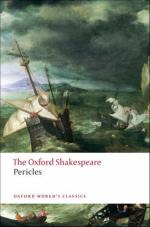|
This section contains 5,513 words (approx. 19 pages at 300 words per page) |

|
SOURCE: Semon, Kenneth J. “Pericles: An Order Beyond Reason.” Essays in Literature 1, no. 1 (spring 1974): 17-27.
In the following essay, Semon argues that Pericles conveys a world where moral rules do not apply and where most of the characters respond to events with a sense of unexplained wonder. According to the critic, the only exception to this rule is Gower, who offers a strictly moral perspective that is inadequate in explaining the play's unusual events.
Like the tragedies, Shakespeare's last plays work toward evoking the dramatic effect of admiratio, or wonder.1 But the effect of wonder in the tragedies depends upon the actions of a central character, usually those leading to the suffering and death of a great man; whereas, in the last plays, wonder derives from the fantastic and unexpected nature of events. The experience of wonder unique to Pericles derives not only from the nature of events...
|
This section contains 5,513 words (approx. 19 pages at 300 words per page) |

|


